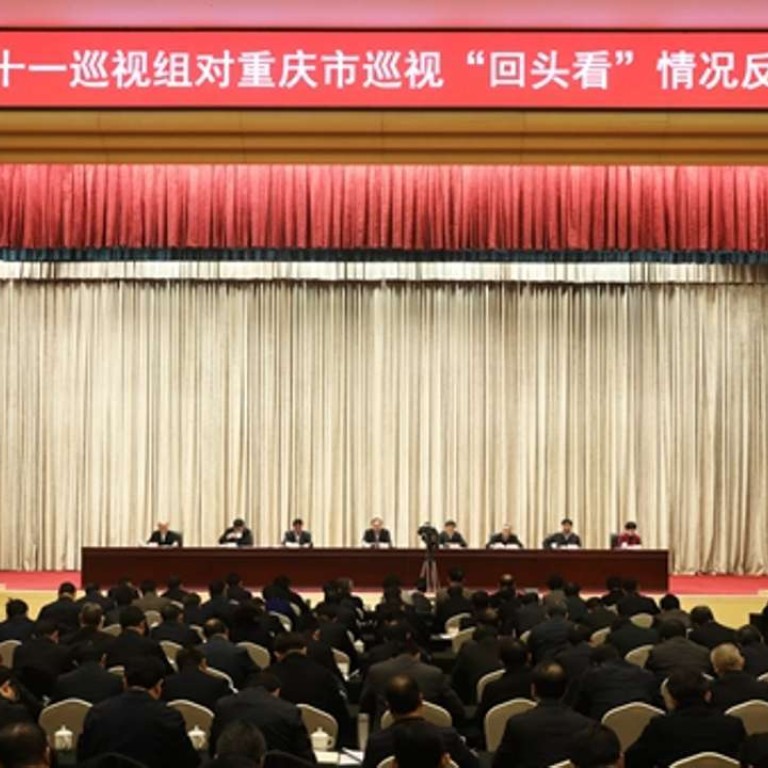
Chongqing still grappling with ‘pernicious legacy’ of Bo Xilai
Former party chief has negative influence on city five years after his downfall, according to corruption watchdog
Five years after the dramatic downfall of Chongqing’s former party chief, Bo Xilai, the city still has yet to rid itself of his “pernicious legacy”, the Communist Party’s top graft watchdog said.
The spectacular fall from grace of Bo, a rival to President Xi Jinping in the lead-up to the last leadership transition, was China’s biggest political scandal in decades.
Bo, along with other fallen “tigers” including former security tsar Zhou Yongkang, former Central Military Commission vice-chairmen Guo Boxiong and Xu Caihou and former presidential aide Ling Jihua, was accused of involvement in “political conspiracies” by Xi in October. This signalled that power struggles – and not just corruption – led to their downfalls.
The charismatic princeling and former Politburo member was jailed for life in September 2013 for corruption. But as the next reshuffle of top leaders closes in, the reverberations of the political shake-up can still be felt in the southwestern city, where Bo ruled for more than four years, according to the party’s top graft busters.
During a two-month inspection that ended in early January, officers from the Central Commission for Discipline Inspection for Discipline Inspection (CCDI) found the “pernicious ideological legacy” left by Bo and his right-hand man, Wang Lijun, “had not been wiped out completely”, according to a statement on the agency’s website on Monday.
Wang was the city’s police chief, who spearheaded Bo’s heavy-handed crackdown on organised crime. Wang’s flight to the US consulate almost exactly five years ago set off the political firestorm that brought his boss down from a possible ascension to the nation’s top leadership.
During his overnight stay at the consulate in Chengdu in February 2012, Wang revealed shocking details about Bo, including his wife Gu Kailai’s poisoning of British businessman Neil Heywood. Gu was later convicted of the murder and received a suspended death sentence, while Wang was handed a 15-year jail term for abuse of power and defection.
Without elaborating on what their legacy was, the head of the inspection team, Xu Lingyi, urged Chongqing officials to seriously address the problem of Bo and Wang’s remaining influence, and to respect the authority of the party’s central leadership with Xi as its core.
The city was not doing enough to “seriously eradicate the poisonous legacy of Bo and Wang”, Xu said, adding that local authorities had to tighten their supervision to build a “positive political ecology”.
Zhu Jiangnan, an assistant professor at Hong Kong University whose research focuses on corruption, said that from the context of the CCDI’s report, the influence of Bo and Wang was still being seen in a failure to obey the leadership of the party Central Committee.
Zhuang Deshui, an anti-corruption expert with Peking University, said that although Bo had long left Chongqing, some people he had promoted were still in office, and some of his policies were still in force.
Zhuang said that one such person was Huang Qifan, who was promoted to mayor on Bo’s watch and kept the position after his downfall. Huang stepped down as mayor in December, and is tipped to be transferred to one of the sub-committees under the National People’s Congress. His resignation as mayor coincided with the CCDI’s inspection there.
It was not the first time CCDI inspectors had toured Chongqing. In the summer of 2013, a two-month inspection by the bureau found that the municipality had failed to impose sufficient supervision on its top leaders. It also warned about corruption risks in Chongqing’s state-owned enterprises, and claimed there was rampant graft among low-ranking officials.
The latest inspection concluded that some of the problems discovered during the 2013 inspection were not addressed properly. Corruption in the city’s SOEs was “still severe”, the report said.
Zhuang said the focus of CCDI inspections tended to change over time, with political loyalty and ideology being the key focus now.
The party is preparing for its once-every-five-years top-level reshuffle this autumn, with Xi demanding that officials do everything they can to ensure “a stable environment” for the Communist Party’s 19th national congress.

